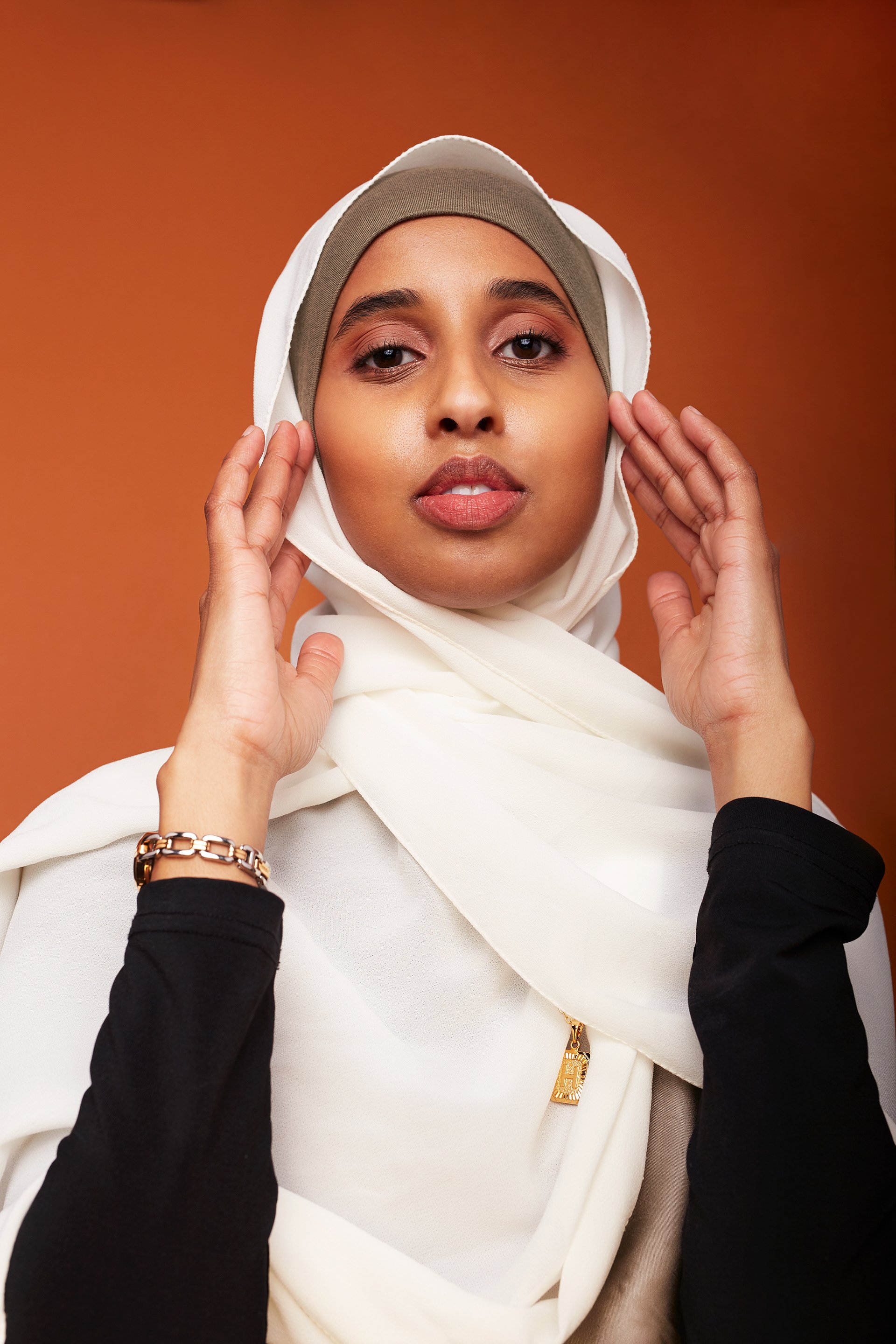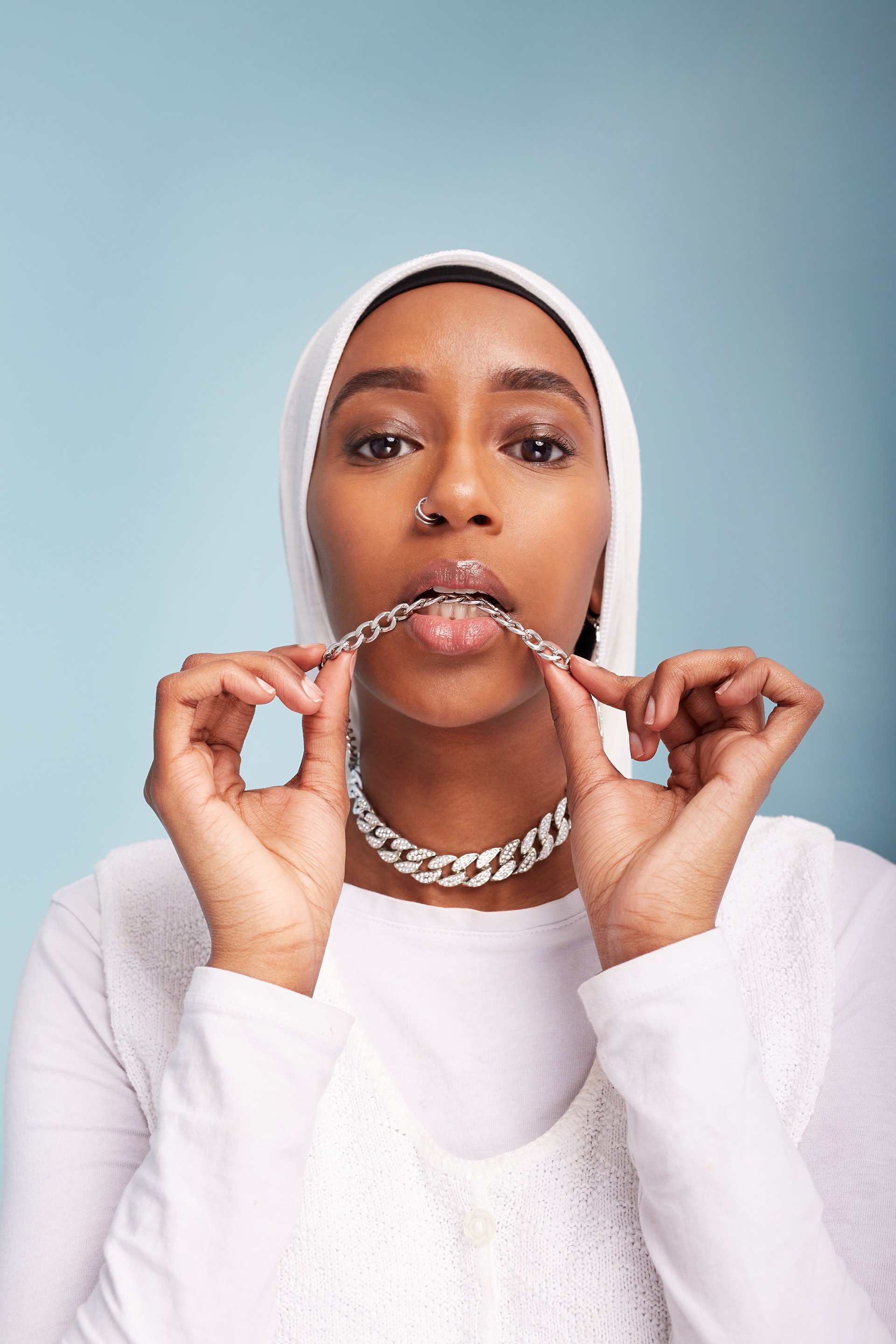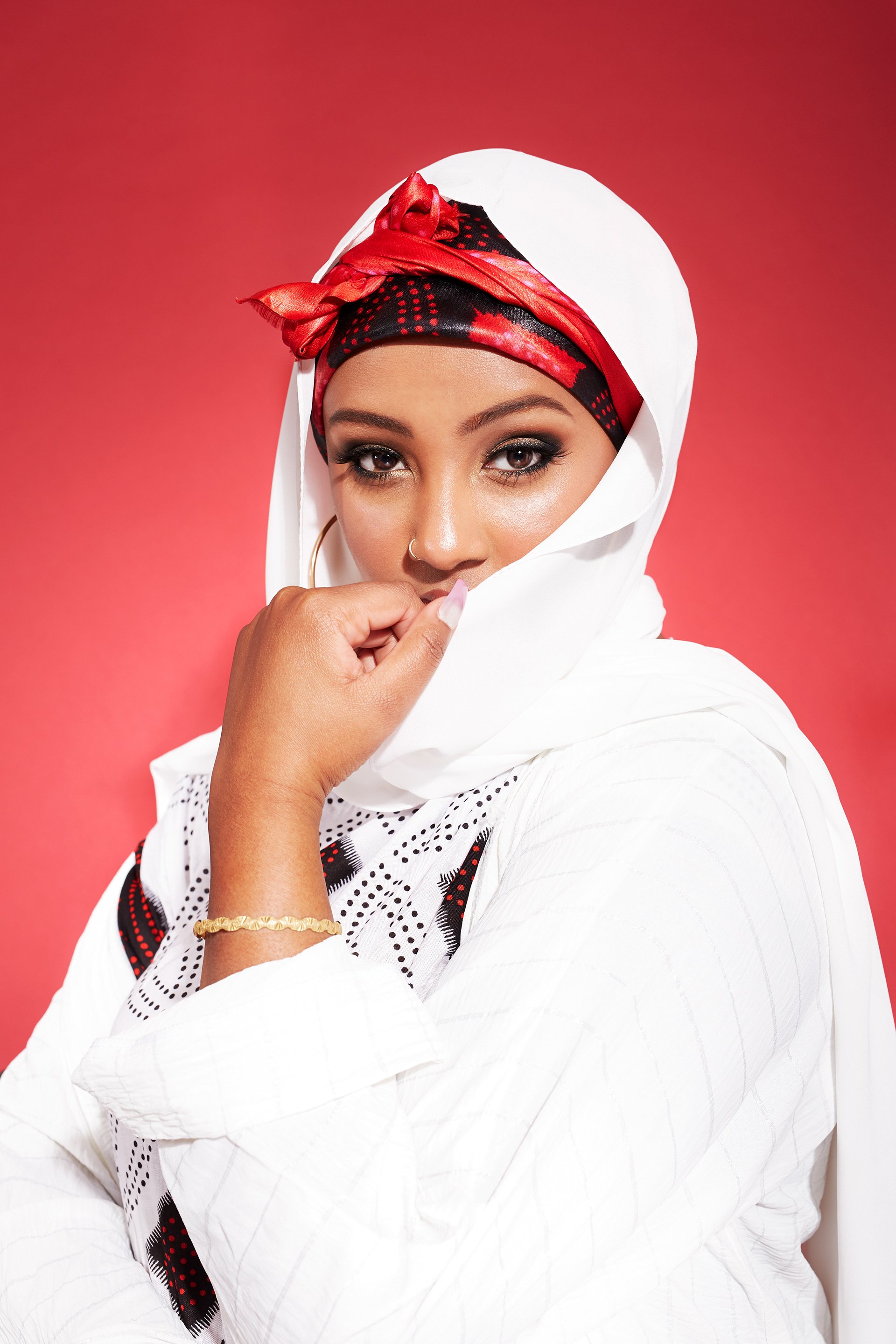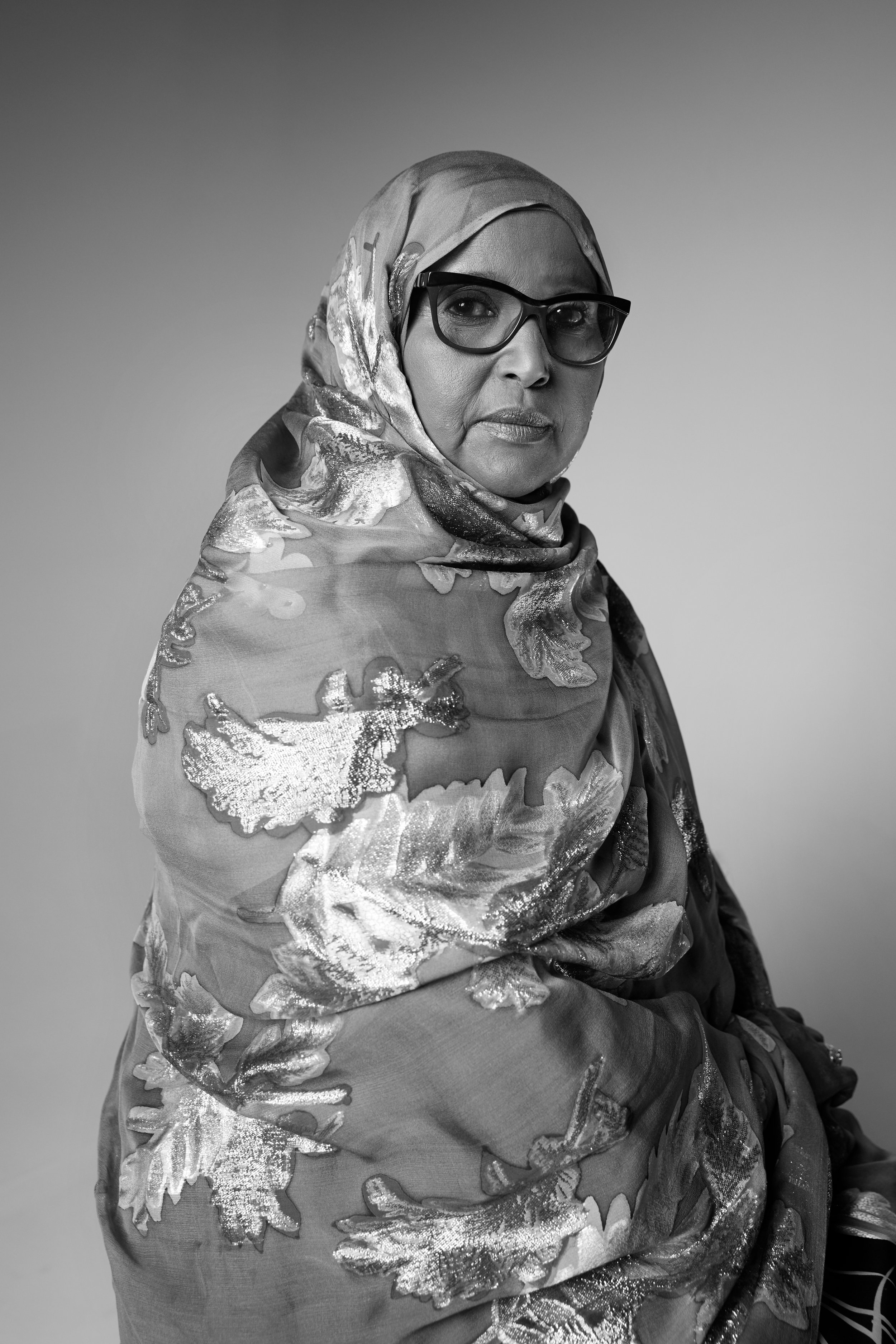Essay 1 of Through Our Lens: Faisa Omer
Faisa Omer knew that she wasn’t seeing what she wanted to see. Omer says you’re subject to seeing what society wants you to see in a saturated world. When society doesn’t look, advocate or mirror your identity, you are exclusively seeing images that don’t reflect who you are.
That’s where Omer’s art comes in—putting Somali Canadians and Black people in front of her lens to validate what already exists in her community. “At some point, I realized no one’s going to do it except us,” says Omer, reflecting on the odds set up to hurt rather than help someone like her. Yet there’s a third outcome that sometimes turns hurt into humility, especially when you decide that your identity, no matter how minor society tells you, is the one thing that channels character, honesty and grit.
“I like being Black. I’m happy I was born Black. I love taking pictures of Black people. I think we’re beautiful. I think I’m beautiful. I’m going to keep taking more shots of beautiful Black people. It all just goes back to being unapologetic,” says Omer.
As a Somali Canadian living in Edmonton for the past four years, Omer’s lived experiences translate into her photographs. Omer works with RAJO (meaning “hope” in Somali), a community program that works within school districts to support Somali Canadian youth and their families. As a mental health counsellor for RAJO, Omer is present with the challenges Somali Canadian youth face and makes her advocacy for them visible and known. “I've seen kids that I've advocated for just flourish before my eyes because they've never had anyone. They've never had an opportunity of having a Black staff member,” says Omer.
As a full-time mental health counsellor, Omer can use her mental well-being skills in her photography sessions. Connecting and conversing with a new subject takes vulnerability, and opening up to someone holds an honourable memory in Omer’s catalogue of photos. “I could see if they're being triggered or if I should leave a question alone. Or if I have to stop taking pictures and spend time on [a certain] question and help them navigate their feelings and emotions,” says Omer.
Her photography is therapeutic, and Omer describes that not just photos but also words bring a contagious breakthrough when you can hear voices in an image. In a photograph, a subject’s lips may be sealed in exhaustion, but an accompanying quote or interview may reveal the passion hidden with visible fatigue.
“I got a lot of messages from people in Ottawa, my hometown, and a lot of people who weren't Somali, a lot of people weren't Black. And they were shocked because there was an array of emotions in what they were reading from the project. That made me realize how powerful it is to share our stories with a wider audience,” says Omer. Omer explains that sharing with people outside your community shows how much we must do to understand each other.
Photos have the power to create a bridge of awareness between cultures. Yet, for our Black community, we share joyfully vibrant realities and trauma-filled ones. Omer boldly says, “It’s not life-changing because I’m living it, too,” before telling me about the historical attack on Muslim women on a national and global level. As often as six attacks occur in one month. Motivated by hate, Edmonton’s history of physical and verbal attacks on Muslim women breeds a complicit reaction from outsiders as society brushes yet another Muslim woman under the rug in hopes of keeping their photo op clean.
That’s where Omer’s art steps in (again)—its purpose is to reveal the truths Muslim women face daily and the emotional scars they live with. In a project with CBC’s Black on the Prairies, Omer gathered six Muslim women of different ages, stages in life and occupations. To reclaim the space where attacks took place, an image of the area was lit up and projected on them. Edmonton public spaces, like the Century Park LRT, the parking lot of the Southgate Mall, the University Transit Centre, and the Whyte Avenue intersection, would reflect onto their face and clothing in a life-sized picture.
“It’s still happening,” says Omer, adding that the latest attack happened in January. Omer sees the value of sharing Muslim women’s voices and believes the city is not doing enough. “Being in the photography game, sometimes you have to use marketing to get messages across to like a large group of people,” says Omer. Photos and videos can extend your reach and land in the eyesight of someone oblivious to the hate crimes against Muslim women in Edmonton.
“Being a Black Muslim woman, to protect myself, the way I cope with this kind of news of people, like me, being attacked is to lock it up somewhere in my head and pretend it's not happening. Yet sitting [in the studio] and listening to everyone's story and the way everyone feels was pretty emotional,” says Omer.
Unleashing those emotions means revisiting some of the most challenging moments of your life. For a 17-year-old high school student Omer photographed, that means holding onto her friend’s hand every time she’s in public, in case someone pushes her. “This is a 17-year-old who can’t enjoy just going to the mall,” says Omer.
For a mother and daughter duo, photographed by Omer, that means putting her daughter into karate classes so she can protect herself. “We have to make all these life changes. We’re the ones being inconvenienced,” says Omer. Omer says it makes you feel like a second-class citizen. Interviewing one of the women attacked in a string of hate crimes, Omer says the woman said she didn’t feel “Canadian” enough. Attacked in public at a train station during the daytime, the woman recalled that no one came to her aid, and no one stayed behind to leave a statement. She felt utterly alone.
Alone.
That ties us together—the unshakeable feeling of pushing through the covers of loneliness—but also the awakening when we realize that in this darkness, hands are within reach. Our ancestral foundation of Black women has guided us and led us to a place where we truly respect and love ourselves. Born and raised in Ottawa, Omer says her mother represents that guidance. “The biggest hero of my life,” Omer describes her mother. Omer is the oldest among seven siblings and says familiar support at home is uplifting in times like these. “In the Somali community, mothers have a lot more onus on them. They're the ones calling the shots,” says Omer.
Hooya means “mother” in Somali.
The power of our words affects who we want to be. Omer says for younger Somali and Black youth, you have to counteract what society is telling you. Omer’s go-to list for striking some sun on cloudy days:
Positive mantras in the morning
You got to tell yourself you're beautiful all the time, even when you're not feeling beautiful
Surround yourself with beautiful Black people
You have to use everything you're consuming (it affects you) to impact you positively.
If you have a dream, follow it no matter what it is. Just put time into it.







